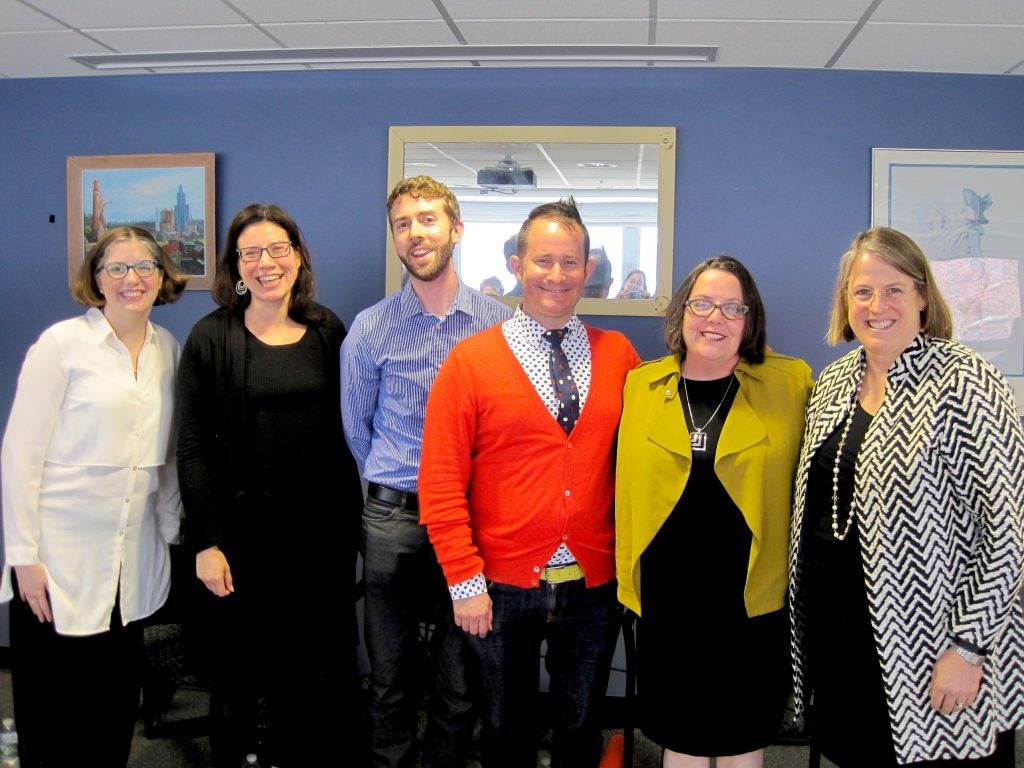Panelists from Regional Cultural Organizations Talk PhD Education and Careers with English Graduate Students and Faculty
On Friday, April 28, the Cultural Organizations committee, under the leadership of Professor Martha Rojas, welcomed guests from regional cultural organizations for a forum on PhD careers and possibilities for experiential learning for graduate students.
We were excited to host Morgan Grefe, Executive Director of the Rhode Island Historical Society, Jack Martin, Executive Director of the Providence Public Library, Sarah Rose, Vice President of Education and Programs for the New Bedford Whaling Museum, and Micah Salkind, the Special Programs Manager for The City of Providence Department of Art, Culture + Tourism. Elizabeth Francis, Executive Director of the Rhode Island Council for the Humanities and a member of the Cultural Organizations committee, moderated.

Left to Right: Grefe, Rojas, Salkind, Martin, Francis, and Rose on April 28, 2017.
The forum provided an opportunity to discuss the future of literary and cultural studies, the nature of collaborative work and doctoral education, and what is important about literary studies for the lives of our communities. The forum also acknowledged that while many PhDs work in cultural organizations, this hasn’t yet been integrated into PhD training.
Francis structured the conversation on intersections between the work of cultural organizations and literary studies scholars, allowing the panelists to speak to the ways in which the work they do calls for the kind of training PhD students get as well as the projects that PhD students could undertake with cultural organizations.
Grefe spoke about the need to digitize collections. She explained that having many artifacts calls for determining which ones are digitized first. The RIHS often bases these choices on what scholars are calling for access to or on knowing what scholars will need to access in the near future. This requires close relationships with universities. Grefe added that the inquiry-based research methods of PhD students and their analytical abilities prepare them for the kind of work RIHS does.
Salkind discussed how his PhD training (in American Studies) prepared him to do public work, especially in place-making, like the city’s projects to tell the narratives of certain neighborhoods, make connections, or bring community members together in cultural programs. He added that the listening and interpretation skills he developed in his PhD training serve him every day.
Martin described the library’s recent developments as going “from a supermarket model to a kitchen model,” meaning that the library is not only a place to select books off the shelf, but a place to find the ingredients to design projects, conduct research, develop solutions, make art, or acquire a range of skills—all practices PhD students are engaged in.
Rose discussed the museum’s new educational programming and the connections to the teaching work PhD students do in the university. Rose also described the museum’s work with the Melville Scholars and its work telling the stories of man’s interaction with whales in relation to current events and ways of thinking.
The panelists gave us great examples of the versatility of a humanities PhD and the ways doctoral students can produce collaborative projects and scholarship in partnership with cultural organizations. We look forward to a continued relationship between the next generation of PhDs at URI and the organizations celebrating, preserving, and curating the region’s cultural artifacts!
 Home
Home Browse
Browse Close
Close Events
Events Maps
Maps Email
Email Brightspace
Brightspace eCampus
eCampus



